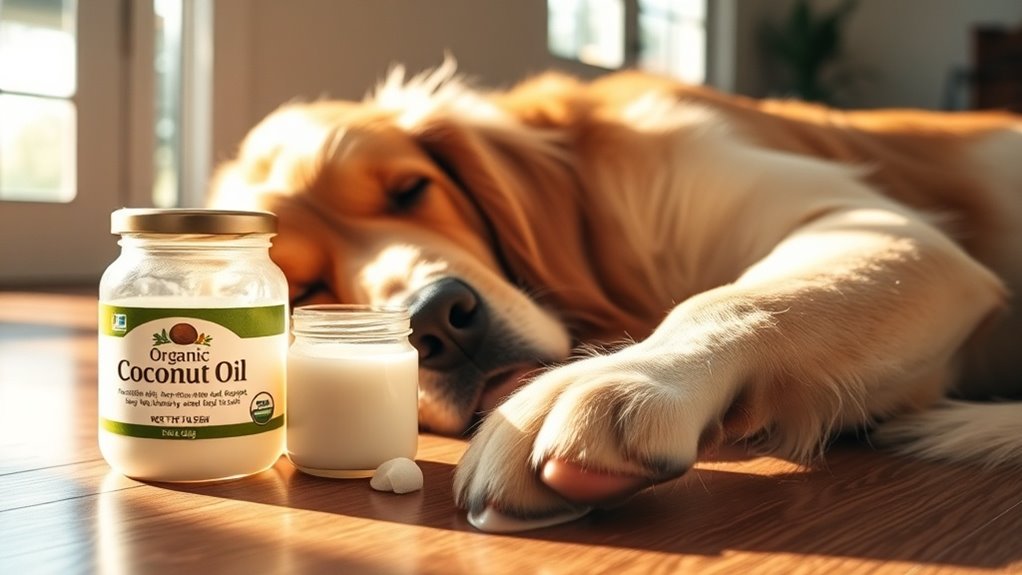How I Use Coconut Oil on My Dog (And Why It’s Great!)
The Science Behind Coconut Oil for Dogs
While many pet owners rely on anecdotal evidence, the scientific basis for coconut oil’s benefits in dogs stems from its unique composition of medium-chain triglycerides (MCTs).
These MCTs are quickly absorbed and metabolized by your dog’s body, providing readily available energy. The primary MCT in coconut oil, lauric acid, has demonstrated antimicrobial, antifungal, and anti-inflammatory properties in research studies.
Additionally, caprylic and capric acids found in coconut oil support immune function and help maintain healthy gut flora.
When you’re considering coconut oil for dogs, understand that its fatty acid profile can help improve cognitive function and support skin health. Moreover, coconut oil’s antibacterial and anti-inflammatory properties make it an excellent aid for skin conditions in dogs.
Health Benefits for Your Canine Companion
Your dog’s health can benefit from coconut oil in several evidence-based ways, including improved skin and coat condition through its natural moisturizing properties. The medium-chain triglycerides in coconut oil strengthen your pet’s immune system by fighting harmful bacteria and viruses. Additionally, when administered orally, coconut oil aids your dog’s digestion by supporting nutrient absorption and promoting healthy gut function. Regular use of coconut oil can also enhance overall wellness by providing quick energy, which helps keep your dog active and playful.
Improves Skin and Coat
The topical application of coconut oil can significantly improve your dog’s skin and coat health through its unique combination of medium-chain fatty acids and antimicrobial properties.
When you apply coconut oil to your dog’s skin, it penetrates deeply to moisturize and heal. The lauric acid in coconut oil helps eliminate harmful bacteria, fungi, and yeast that can cause skin infections and irritation.
You’ll notice reduced itching, dandruff, and hot spots while promoting a shinier, softer coat.
For best results, massage a small amount into your dog’s skin weekly. The oil’s natural properties help heal minor cuts, provide relief from insect bites, and protect against environmental damage.
Boosts Immune System Function
Incorporating coconut oil into your dog’s diet can strengthen immune system function through its unique antimicrobial and anti-inflammatory properties.
The medium-chain triglycerides (MCTs) in coconut oil help fight viruses, bacteria, and fungi while reducing inflammation throughout your dog’s body.
The lauric acid in coconut oil converts to monolaurin, a compound that helps combat harmful pathogens and supports your dog’s natural defense mechanisms.
You’ll also find that coconut oil’s antioxidants neutralize free radicals and reduce oxidative stress.
When administered regularly, coconut oil can help your dog maintain optimal immune response and recover more quickly from infections.
Promotes Healthy Digestion
Coconut oil’s medium-chain fatty acids support multiple digestive functions in dogs, from improving nutrient absorption to regulating bowel movements.
These MCFAs help eliminate harmful bacteria and parasites in your dog’s gut while preserving beneficial flora.
You’ll notice improved digestion when you add coconut oil to your dog’s diet, as it aids in breaking down food and reducing inflammation in the digestive tract.
The oil’s antimicrobial properties can help prevent stomach upset and reduce bad breath. It also supports your dog’s pancreatic function, helping to maintain healthy enzyme production essential for proper digestion.
My Dog’s Journey With Coconut Oil
After finding my golden retriever Max struggling with persistent skin irritation, I began implementing a controlled coconut oil regimen to address his symptoms.
I started with 1/4 teaspoon daily, gradually increasing to 1 teaspoon over two weeks while monitoring his response.
Within three weeks, Max’s scratching decreased significantly. His coat became noticeably shinier, and the dry patches began healing.
After six weeks of consistent application, both topically and orally, his skin condition improved by approximately 80%. Regular vet check-ups confirmed no adverse reactions, and blood work showed normal lipid levels throughout the treatment period. Additionally, the antimicrobial properties of coconut oil helped prevent further skin infections during his recovery.
Safe Application Methods and Dosage
When administering coconut oil to dogs, proper dosage and application methods are crucial for optimal results. Start with 1/4 teaspoon per 10 pounds of body weight, given orally once daily. You’ll need to mix it into your dog’s food or let them lick it directly from a spoon.
For topical use, apply a thin layer to affected skin areas using clean hands. Don’t exceed applications more than twice daily. If you’re treating hot spots or dermatitis, gently massage the oil into the skin and monitor for any adverse reactions. Regular use can help promote smoother, healthier skin, making coconut oil an excellent addition to your dog’s grooming routine.
Always introduce coconut oil gradually to prevent digestive upset.
External Uses for Skin and Coat Care
You’ll find coconut oil effective for treating your dog’s hot spots by reducing inflammation and supporting natural healing processes. When applied regularly to your pet’s coat, the oil’s natural compounds can help repel fleas while moisturizing the skin beneath. You can protect your dog’s paw pads from cracking and winter damage by massaging a thin layer of coconut oil into the pads before walks. Additionally, its antibacterial properties help maintain a healthy skin environment, preventing infections and further irritation.
Treating Hot Spots
Since hot spots can cause intense discomfort for dogs, coconut oil’s antimicrobial properties make it an effective natural treatment option.
The oil’s lauric acid fights bacteria and fungi while reducing inflammation in the affected area.
To treat hot spots, first clean and dry the area thoroughly.
Apply a thin layer of unrefined coconut oil directly to the hot spot 2-3 times daily.
Monitor your dog to prevent licking for 10 minutes after application.
The oil’s moisturizing effects help soothe irritated skin while creating a protective barrier that promotes healing.
Continue treatment until the hot spot resolves.
Natural Flea Defense
Although chemical flea treatments remain popular, coconut oil provides a natural alternative for repelling these parasites. The lauric acid in coconut oil acts as a natural insecticide, making your dog’s skin and coat less appealing to fleas.
You can apply a thin layer directly to your pet’s fur, focusing on areas where fleas commonly gather.
For enhanced protection, combine coconut oil with other natural flea deterrents like neem or cedarwood essential oils. While not as potent as chemical treatments, this natural approach can help reduce flea populations when used consistently.
Remember to reapply every few days, especially after bathing or swimming.
Paw Pad Protection
During winter months and hot summer days, coconut oil serves as an effective protective barrier for your dog’s sensitive paw pads.
Apply a thin layer of coconut oil before walks to shield paws from salt, ice, hot pavement, and rough terrain. The oil’s antimicrobial properties help prevent infections from small cuts or abrasions, while its moisturizing elements keep pads supple and prevent cracking.
For best results, massage the oil into your dog’s paw pads before bedtime, allowing overnight absorption.
If your dog’s paws show signs of severe dryness or injury, increase application frequency to twice daily until the condition improves.
Dietary Integration and Feeding Tips
When incorporating coconut oil into your dog’s diet, start with small amounts and gradually increase the serving size over several weeks.
The recommended daily amount is 1/4 teaspoon per 10 pounds of body weight, divided into two servings. Monitor your dog’s response and adjust accordingly.
- Mix coconut oil into your dog’s regular food while it’s still solid
- Drizzle melted coconut oil over kibble or wet food
- Add coconut oil to homemade dog treats before baking
- Serve directly from a spoon as a nutrient-rich reward
Stop supplementation if you notice loose stools or digestive issues.
Consult your veterinarian before starting any new supplement regimen.
What to Watch For: Safety Precautions
While coconut oil offers many potential benefits for dogs, it’s essential to monitor your pet for adverse reactions and safety concerns.
Watch for signs of diarrhea, greasy stools, or digestive upset, which may indicate you’re giving too much oil. Stop use immediately if your dog shows allergic reactions like itching or rashes.
Don’t exceed recommended dosages of 1 teaspoon per 10 pounds of body weight daily. If your dog has pancreatitis, obesity, or metabolic disorders, consult your vet before use.
Keep containers sealed and stored properly to prevent rancidity, and always choose unrefined, virgin coconut oil without added ingredients.
Best Practices for Storage and Selection
To maintain coconut oil’s therapeutic properties for your dog, proper storage and selection are crucial.
Choose virgin or unrefined organic coconut oil, as it retains more beneficial compounds than refined varieties. Store in an airtight glass container away from direct sunlight and heat sources.
- Keep at room temperature (75°F/24°C) in a dark pantry
- Look for oil that’s clear when liquid, pure white when solid
- Check for certification labels from organic certification bodies
- Select containers with tight-sealing lids to prevent oxidation
Replace the oil if you notice any rancid smell, yellowing, or mold growth.
Most unopened coconut oils stay fresh for two years.







